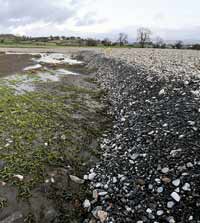Floods leave farmland under millions of tonnes of gravel

Cumbria farmers say it is impossible for them to attempt to shift the millions of tonnes of gravel lying on meadows following the Cockermouth floods and are calling on the government to declare the area a disaster zone.
Hundreds of acres of valuable grazing land – described by one dairy farmer as like a scene from the First World War – are now “unfarmable”.
As farmers count the cost of the sheer scale of the flood damage – which has smothered fields waist-high in gravel – they say their businesses face “catastrophic consequences” unless the government sends in a skilled labour force with commercial plants and machinery used for quarrying.
Cockermouth farmer David Wilson has 22 acres of winter wheat on grade 2 land that is now covered in gravel. “It’s like the trenches from the First World War with holes 10ft deep and thousands of tonnes of gravel up to 3ft deep covering the whole field,” he said.
“It’s bad enough losing the crop but how do we get rid of this gravel? The field is unfarmable. We can’t even think about moving it with a tractor and front-end loader.
“Troops should be brought in with commercial quarrying or coal mining equipment or hundreds of acres will never be farmed again,” said Mr Wilson.
Beef and sheep producer Richard Corlett said the area should be declared a disaster zone.
He has around 25,000t of gravel on low-lying fields which are in an SSSI.
“Hilary Benn says farmers and the environment are more important than ever, but if he was farming here, could he move this tonnage of gravel before the emergency derogation expires on 31 December?
“DEFRA won’t help and the Environment Agency won’t make a decision. They’ve told me that I can keep the stone for my own use, but usually if you take anything from a river they say you’ll be prosecuted f you use it
“The EA says I can’t put the stone back in the river because it’s now classed as waste material,” said Mr Corlett.
An EA spokesman confirmed a meeting had taken place on Tuesday (1 December) between the agency, Natural England and the NFU, but said the EA had no funds available to mount a clear-up operation.
“We are aware of the difficulties farmers face and advise individual farmers to approach us to discuss their own situation,” he said.
“We are planning to have meetings in the next few weeks where farmers can express there concerns.”
See more pictures of the flooding in our gallery.

